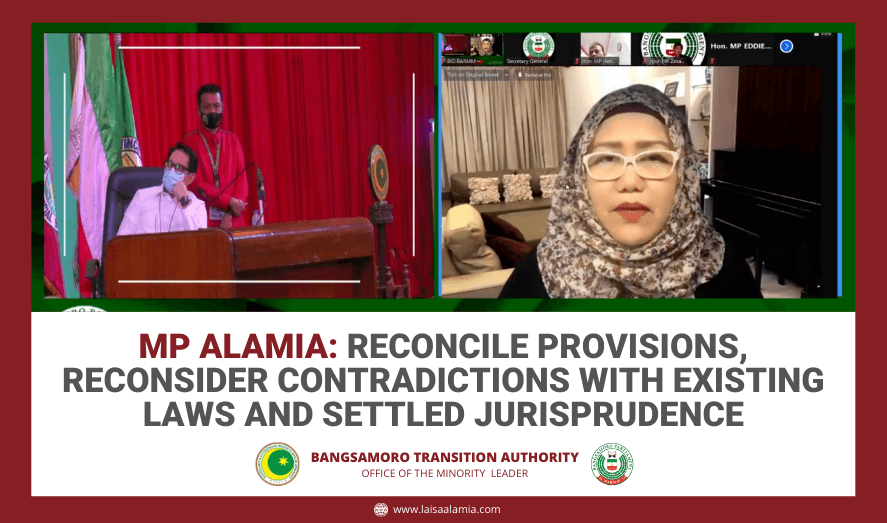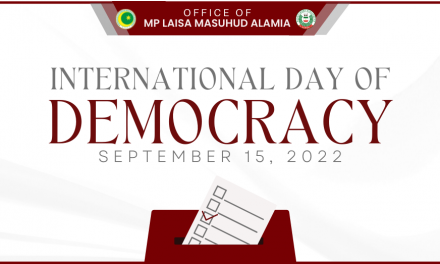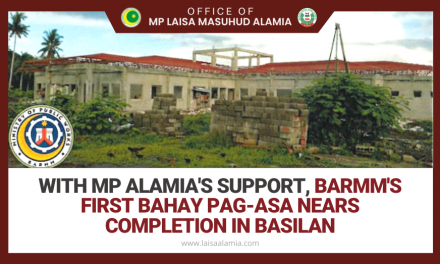As the interpellations on the Bangsamoro Civil Service Code (CSC) continue in the parliament, Minority Floor Leader MP Atty. Laisa Masuhud Alamia raised concerns over consistency of language and legal basis for a number of provisions in the draft code.
Among these was the need to recognize existing third level positions in the BARMM bureaucracy, emphasizing the need to acknowledge these positions. These are points she also raised in the session yesterday, in the hopes of clarifying what will happen to third level positions with third level eligibility.
When MP Alamia asked, “does this mean that the appointment papers and position description form of those occupying permanent, third level positions, will be revised to reflect that their positions are not third level positions?” MP Anna Tarhata Basman, one of the proponents of the proposed measure, answered with “I think, in practical terms, yes.”
MP Alamia also asked for clarification on provisions that, according to MP Basman, were lifted from the National Administrative Code. These include provisions on the prohibition on detail or reassignment, and nepotism.
The current draft of the CSC provides that “no detail or reassignment whatsoever shall be made within three months before any election unless authorized by the COMELEC.” MP Alamia noted that aside from sentence construction and word use, a 2019 resolution issued by the Civil Service Commission en banc talks about “the prohibition on not just detail or reassignment, but the transfer, movement, and even appointment of any person in the civil service not just prior to the elections but also after,” based on settled jurisprudence.
MP Alamia also sought to clarify the provision regarding nepotism. She said that she was “glad to see the term nepotism is included in the draft code” as it declares “all appointments in favor of a relative are hereby prohibited,” up to the third degree of consanguinity or affinity. However, Alamia questioned why “relative” is defined only up to the third degree, as opposed to definition in regular laws of nepotism, such as the Local Government Code of 1991 and CSC Rules, which extends up to the fourth degree of consanguinity and affinity?
She also noted that it is commendable that the definition of nepotism in the draft CSC already recognizes jurisprudence which acknowledges fault not only in the appointing authority but also recommending authority and those who exercise immediate supervision over the position. However, she questioned the legal basis for the provision which suggests any act of nepotism will be remedied by transferring the appointee, with no promotions nor salary increase allowed pending said transfer.
This provision, according to the MP Basman, was also directly lifted from the National Administrative Code but concedes that said provision is no longer necessary given the ban on nepotism.
Other provisions which MP Alamia sought to clarify were said to be lifted from the 2017 Rules on Administrative Cases in the Civil Service (RACCS). This includes Article 222 which concerns technicalities of law and procedure, and Article 280 which concerns administrative offenses and penalties.
The current draft of the CSC notes that administrative hearings and investigation are not bound by technicalities of law and procedure, and the rules of court, provided that due process is not compromised. When asked about the legal basis for this provision, MP Basman notes that this is a “reformulation of what is reflected in 2017 RACCS.” However, MP Alamia pointed out the need to follow provisions already found in national laws, rules and regulations, with regard to jurisprudence, substantive law, and procedural law.
MP Alamia also noted that under the provision on administrative offenses and penalties, a suspension of six months to one year is indicated with regard to nepotism, She highlighted the need to clearly enumerate “who are punishable, who shall be punished, and what the punishment will be”.
Next to nepotism, MP Alamia pointed out a provision regarding “disloyalty to the Republic of the Philippines, including the Bangsamoro Autonomous Region in Muslim Mindanao, and to the Filipino people, including the Bangsamoro people.” She described this as a “very general description of a grave offense” where “elements are not defined.”
She noted the ambiguity in the provision, making it “difficult to prove and prosecute, and difficult for the person to defend himself since the elements and parameters are not clear.” The proponent admitted to being “unaware of the elements.” The provision is already contained in 2017 RACCS, but with an “enhancement” due to the inclusion of the BARMM and Bangsamoro people, and that they would “defer to how Civil Service Commission treated this offense and dealt with cases dealing with this.”
MP Alamia, however, said that “we should be very clear” since these are “grave offenses which could cost the job of a civil servant.” While the offense “disloyalty to the Republic of the Philippines and the Filipino people” is clear and has existing jurisprudence, “disloyalty to the BARMM and Bangsamoro people” implies a new offense, which requires a clear outline of its elements and parameters.
MP Basman said that they are “ready to listen” to suggestions regarding language and construction of provisions in the draft CSC in the proper time, which is the period of amendments following the end of interpellations in the parliament.








